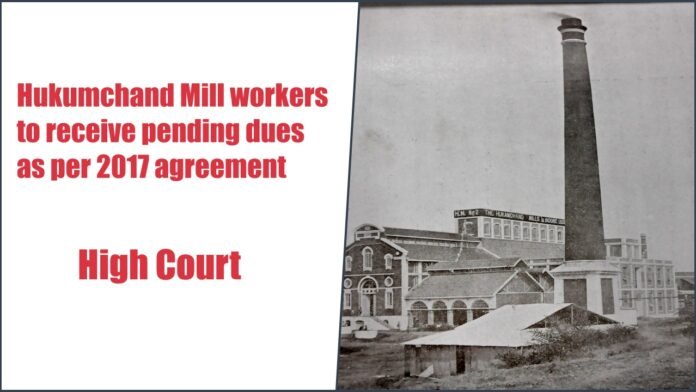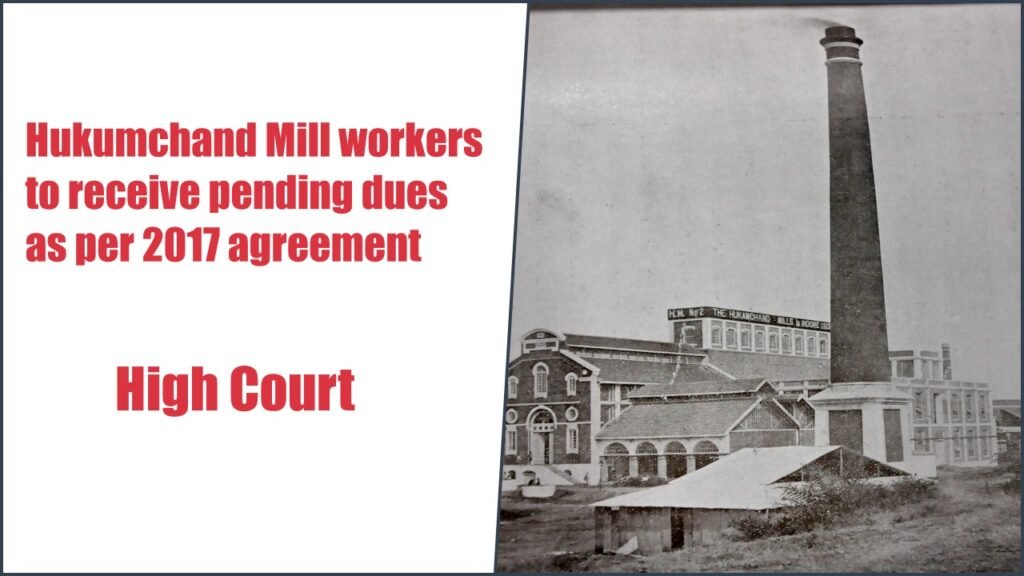
Indore: The Indore bench of Madhya Pradesh High Court has directed the liquidator of the closed down Hukumchand Mill to pay the pending dues of the workers as per the terms and conditions on which they were partially paid in the year 2017.
The order was passed on Monday by a division bench comprising Justice S C Sharma and Justice Shailendra Shukla, who heard a petition filed by the workers of the mill, seeking their dues from the liquidator.
Background of the case
The Hukumchand Mill, which was established in 1888, was one of the largest textile mills in Asia. It employed over 10,000 workers and produced cotton, silk, and rayon fabrics. However, the mill was shut down on December 12, 1991, due to financial losses and labour unrest.
Since then, the workers of the mill have been fighting for their dues, which amount to over Rs 300 crore. Several attempts were made to revive the mill, but none of them succeeded. In 2016, the Madhya Pradesh Housing Board (MPHB) and the Municipal Corporation entered into a pact to acquire the land of the mill for Rs 300 crore and develop it into a residential and commercial complex.
As per the pact, the MPHB had to deposit Rs 217.85 crore in the account of the liquidator, who was appointed by the High Court to oversee the winding up of the mill. The remaining amount of Rs 82.15 crore was to be paid by the Municipal Corporation after the completion of the project.
The liquidator was supposed to distribute the money among the workers, creditors, and other stakeholders of the mill. For this purpose, a three-member committee was formed, comprising the liquidator, a representative of the workers, and a representative of the MPHB.
The issue of payment
The MPHB deposited Rs 217.85 crore in the account of the liquidator on December 20, 2020. However, the payment to the workers was delayed due to various reasons. The workers alleged that the liquidator and the committee were asking for unnecessary documents and salary slips from them, which they did not have.
The workers claimed that they had already submitted their documents, such as identity cards, bank accounts, and provident fund details, to the liquidator’s office in the year 2007. Based on these documents, they had received partial payments of Rs 50 crore in the year 2017. They said that there was no complaint of wrong payment at that time, and the same documents should be used to verify their eligibility for the remaining dues.
The workers also said that it was not possible for them to produce salary slips, as it had been more than 33 years since the mill closed down. They said that the salary slips were either lost or destroyed in the course of time.
The workers approached the High Court with their grievances and sought the intervention of the court to expedite the payment process.
The court’s order
The High Court, after hearing the arguments of both sides, ordered the liquidator to pay the pending dues of the workers on the same grounds on which they were partially paid in the year 2017. The court said that the documents that were deposited in the liquidator’s office in 2007 were sufficient to verify the workers’ claims, and there was no need to ask for salary slips again.
The court also assured the workers that all eligible workers of Hukumchand Mill would get their payment, and no one would be left out. The court directed the liquidator to submit a report on the status of the payment within four weeks. The court also fixed the next date of hearing on March 13, 2024.

The workers welcomed the court’s order and expressed hope that they would finally receive their dues after a long struggle. Labour leader Narendra Srivansh said that the court’s order was a victory for the workers, and thanked the court for its intervention. Advocate Dheeraj Singh Pawar, who represented the workers, said that the court had given justice to the workers, and hoped that the liquidator would comply with the order.


















































